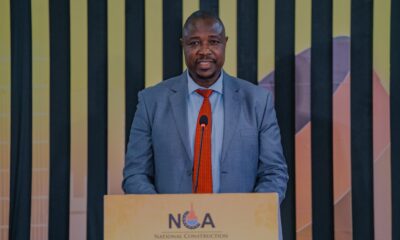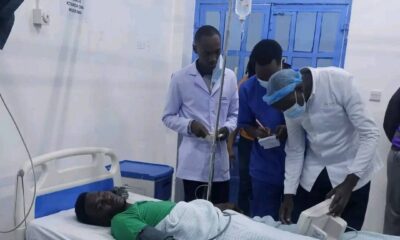News
Learning in Universities Faces Shutdown as Lecturers Announce Strike Over Sh11.5 Billion Arrears
Unless a last-minute compromise is reached, hundreds of thousands of students in public universities and constituent colleges risk being locked out of classrooms from Wednesday

University learning in Kenya is set to grind to a halt from Wednesday after the Universities Academic Staff Union (Uasu) confirmed its members will down tools over unpaid salary arrears amounting to Sh11.5 billion.
Uasu Secretary-General Dr. Constantine Wasonga on Monday reaffirmed that the strike will begin at midnight, accusing the government of reneging on commitments made under previous collective bargaining agreements (CBAs).
“The strike is on. We are downing our tools come midnight tomorrow. No interventions by government have been forthcoming concerning our demands,” Dr. Wasonga declared.
The arrears comprise Sh2.73 billion from Phase Two of the 2021–2025 CBA, due in July, and Sh8.8 billion carried over from the 2017–2021 CBA.
The government had only settled the first tranche of Sh3.4 billion in January this year, with subsequent payments now stalled.
Lecturers Demand Fresh CBA Talks
Beyond arrears, Uasu is pressing for immediate negotiations on the 2025–2029 CBA. The union wants the Inter-Public Universities’ Councils Consultative Forum (IPUCCF) to disclose its counter-offer and share guidance from the Salaries and Remuneration Commission (SRC) ahead of a planned meeting on September 19 at Machakos University.
In a strongly worded letter, Uasu said it would only attend the meeting if provided with “itemised responses” to its demands, which include salary increases, expanded allowances, and enhanced retirement and death benefits.
If implemented, the new package would see graduate assistants’ pay rise from Sh63,647 to Sh86,594, while professors could earn up to Sh305,610 before allowances, with senior dons potentially taking home nearly Sh1 million by 2029.
Accusations of Government Neglect
The lecturers accuse the SRC, Treasury, and Ministry of Education of ignoring binding court orders requiring budgetary allocations to implement the 2017–2021 CBA.
“Going on strike now seems to be the only language the government understands,” Dr. Wasonga said, citing “perpetual neglect” of university lecturers’ welfare.
The industrial action comes just days into the new academic year, raising fears of prolonged disruptions. Last year, a similar strike paralyzed universities for two weeks before it was resolved at the Ministry of Labour.
The looming crisis highlights deeper structural challenges in university funding.
The Presidential Working Party on Education Reform, chaired by Prof. Raphael Munavu, previously noted a disconnect in salary negotiations, with SRC basing pay structures on national considerations rather than the financial capacity of individual universities.
“Unfortunately, this has not been the case, and the budget has remained more or less the same over the years,” the Munavu report observed.
Unless a last-minute compromise is reached, hundreds of thousands of students in public universities and constituent colleges risk being locked out of classrooms from Wednesday, intensifying the strain on an already struggling higher education sector.
Kenya Insights allows guest blogging, if you want to be published on Kenya’s most authoritative and accurate blog, have an expose, news TIPS, story angles, human interest stories, drop us an email on [email protected] or via Telegram
-

 Business1 week ago
Business1 week agoEastleigh Businessman Accused of Sh296 Million Theft, Money Laundering Scandal
-

 Investigations7 days ago
Investigations7 days agoInside Nairobi Firm Used To Launder Millions From Minnesota Sh39 Billion Fraud
-

 Business1 week ago
Business1 week agoMost Safaricom Customers Feel They’re Being Conned By Their Billing System
-

 Business1 week ago
Business1 week agoEXPLOSIVE: BBS Mall Owner Wants Gachagua Reprimanded After Linking Him To Money Laundering, Minnesota Fraud
-

 News7 days ago
News7 days agoUnfit for Office: The Damning Case Against NCA Boss Maurice Akech as Bodies Pile Up
-

 News1 week ago
News1 week agoTax Payers Could Lose Millions in KWS Sh710 Insurance Tender Scam As Rot in The Agency Gets Exposed Further
-

 News1 week ago
News1 week agoPastor James Irungu Collapses After 79 Hours Into 80-Hour Tree-Hugging Challenge, Rushed to Hospital
-

 Sports1 week ago
Sports1 week agoFury as Bettors Demand Probe Into Betika Over Alleged Unpaid Winnings















